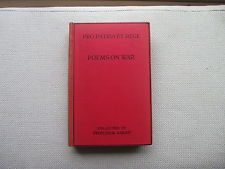Thomas Dewar plate on inside cover Number 1435
Newspaper clipping on Professor Knight laid in.
WW1 anthology.
Preface:
"In the year 1901 I issued a small book entitled Pro Patria et Regina, in response to an appeal by her Majesty Queen Alexandra, on behalf of her Soldiers' and Sailors' fund.
The country now unfortunately stands in need of a larger fund for a more stupendous cause. We are involved in the most gigantic and perilous War that History records; and every Briton must do what in him lies to cooperate in the struggle for Right against Wrong, for the Public Law of Europe and international Honour against self-seeking Despotism with the anarchy to which it invariably leads-and in behalf of the relatively weeak against the numerically strong.
There is no doubt that the present War is the most appaling that has ever happened. Neither the ancient nor the modern world has known anything like it, not only in the number of combatants engaged, or the kind of weapons they have used by land, sea, and air but also in the widespread desolation which has followed, the ruthless butchery of human beings, the villages as well as cities set on fire, priceless art treasures overthrown and even whole libraries destroyed by the invaders. The rules of European civiliziation have been trampled under foot..."
Wikipedia:
William Angus Knight (1836–1916) was a British writer, born at Mordington, Scotland, and educated at the University of Edinburgh. From 1876 to 1902 he was professor of moral philosophy in the University of St. Andrews.[1] In the field of philosophy his work, editorial and other, includes his collection of Philosophical Classics for English Readers (15 volumes, 1880–90), some of which he wrote. Although he wrote numerous publications, he is probably best known for his works on Wordsworth. His edition of Wordsworth's Works and Life (1881–89) is contained in 11 volumes. He presented to the trustees of Dove Cottage, Grasmere, the poet's former home, all the editions of Wordsworth's poems which he possessed. He also corresponded with Robert Browning about Elizabeth Barrett Browning, and on his retirement in 1905 he came to Florence's Swiss-owned so-called English Cemetery to plant the red rose at her tomb, which still flourishes, to honour women's learning, though the enamelled plaque celebrating that act has since been stolen. His portrait was presented to St Andrews University by the Ladies Literate in Arts whose admission he encouraged.
